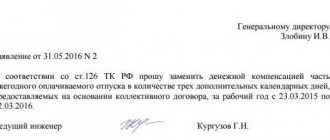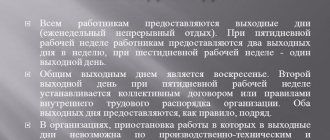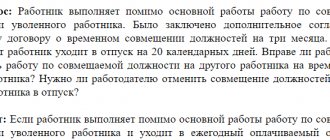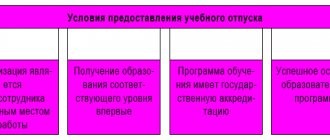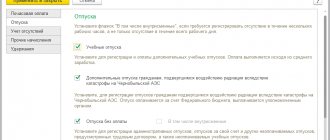- Article 114. Annual paid holidays
- Article 115. Duration of annual basic paid leave
- Article 116. Annual additional paid leave
- Article 117. Annual additional paid leave for employees engaged in work with harmful and (or) dangerous working conditions
- Article 118. Annual additional paid leave for the special nature of work
- Article 119. Annual additional paid leave for employees with irregular working hours
- Article 120. Calculation of the duration of annual paid leave
- Article 121. Calculation of length of service giving the right to annual paid leave
- Article 122. Procedure for granting annual paid leave
- Article 123. Sequence of granting annual paid leave
- Article 124. Extension or postponement of annual paid leave
- Article 125. Division of annual paid leave into parts. Review from vacation
- Article 126. Replacement of annual paid leave with monetary compensation
- Article 127. Exercise of the right to leave upon dismissal of an employee
- Article 128. Leave without pay
back to contents
Article 116. Annual additional paid leave
Annual additional paid leave is provided to employees engaged in work with harmful and (or) dangerous working conditions, employees with a special nature of work, employees with irregular working hours, employees working in the Far North and equivalent areas, as well as in other areas. cases provided for by this Code and other federal laws.
Employers, taking into account their production and financial capabilities, can independently establish additional leaves for employees, unless otherwise provided by this Code and other federal laws. The procedure and conditions for granting these leaves are determined by collective agreements or local regulations, which are adopted taking into account the opinion of the elected body of the primary trade union organization.
back to contents
Another comment on Art. 115 Labor Code of the Russian Federation
1. The Labor Code establishes the following types of annual paid leave:
b) extended main leave;
c) additional holidays.
2. The duration of the annual basic paid leave is set at 28 calendar days. Leave of this duration is granted to all employees if they do not have the right to extended basic or additional leave. In this sense, established by Part 1 of Art. 115 of the Labor Code of the Russian Federation, the duration of annual paid leave acts as the minimum duration of leave guaranteed to all employees.
3. The duration of leave does not depend on the working hours. Basic paid leave of 28 calendar days is provided to both full-time employees and part-time employees (see Part 3 of Article 93 of the Labor Code of the Russian Federation and commentary thereto).
4. Employees engaged in seasonal work are provided with paid leave at the rate of two working days for each month of work. From the same calculation, paid vacations are provided or compensation is paid upon dismissal to employees who have entered into an employment contract for a period of up to two months (see Articles 291, 295 of the Labor Code of the Russian Federation and the commentary thereto).
5. On the provision of paid leave to persons working part-time, see Art. Art. 286, 321 of the Labor Code of the Russian Federation and commentary thereto.
6. Within the meaning of Part 2 of Art. 115 of the Labor Code of the Russian Federation, extended basic leave can be established by law - by the Labor Code itself or other federal law. Taking into account this norm, the provisions of Part 2 of Art. 41 of the Labor Code, according to which the collective agreement may include obligations of employees and the employer, in particular regarding the provision and duration of vacations. The collective agreement may not be about establishing extended vacations, but about providing additional vacations (see Part 2 of Article 116 of the Labor Code of the Russian Federation and the commentary thereto).
7. Extended vacations in accordance with the law are provided to persons under 18 years of age. The duration of their vacation is 31 calendar days (see Article 267 of the Labor Code of the Russian Federation and commentary thereto).
8. Disabled people are granted annual leave of at least 30 calendar days (Article 23 of Federal Law No. 181-FZ of November 24, 1995 “On social protection of disabled people in the Russian Federation”).
9. Extended vacations lasting from 30 to 40 days (depending on continuous experience) are established for rescuers of professional emergency rescue services and units (Federal Law of August 22, 1995 N 151-FZ “On emergency rescue services and the status of rescuers” ).
10. Extended leaves are established for state civil servants of the Russian Federation: persons filling the highest and main positions of the state civil service are granted annual basic paid leave of 35 calendar days, those filling positions of the state civil service of other groups - 30 calendar days (Article 46 of the Federal Law dated July 27, 2004 N 79-FZ “On the State Civil Service of the Russian Federation”).
13. Extended vacations are established for employees working with chemical weapons. Depending on the nature of the work performed with chemical weapons, annual paid leave is granted for a duration of 56 or 49 calendar days (Federal Law of November 7, 2000 N 136-FZ “On the social protection of citizens engaged in work with chemical weapons.” See also p. 7 comments to Article 92 of the Labor Code of the Russian Federation).
14. Teaching staff of educational institutions are granted extended basic leave, the duration of which is determined by the Government of the Russian Federation (see Article 334 of the Labor Code of the Russian Federation and the commentary thereto). By Decree of the Government of the Russian Federation of October 1, 2002 N 724 “On the duration of the annual basic extended paid leave provided to teaching staff of educational institutions,” teaching staff of educational institutions established an extended leave of 56 or 42 calendar days, depending on the position and type of educational institution.
15. For a number of categories of employees, extended basic holidays are established by resolutions of the Government of the Russian Federation adopted before the entry into force of the Labor Code. In accordance with Art. 423 of the Labor Code of the Russian Federation, these decisions are applied insofar as they do not contradict the said Code.
Scientific institutions (organizations) financed from the federal budget are given the right to establish extended vacations for scientific workers who have an academic degree and occupy positions for which the employee’s academic degree is provided for by tariff and qualification requirements approved in the prescribed manner. The duration of leave for doctors of science is 48 working days, for candidates of science - 36 working days (Resolution of the Government of the Russian Federation of August 12, 1994 N 949 “On annual leave of scientific workers with an academic degree”).
This is important to know: Order on the appointment of a coordinator for RFBR projects
Annual paid leave of 36 working days is established for employees of healthcare organizations that diagnose and treat HIV-infected people, as well as employees of organizations whose work involves materials containing the human immunodeficiency virus (Resolution of the Government of the Russian Federation of April 3, 1996 N 391).
Article 119. Annual additional paid leave for employees with irregular working hours
Employees with irregular working hours are provided with annual additional paid leave, the duration of which is determined by a collective agreement or internal labor regulations and which cannot be less than three calendar days.
The procedure and conditions for granting annual additional paid leave to employees with irregular working hours are established in federal government institutions by regulatory legal acts of the Government of the Russian Federation, in state institutions of a constituent entity of the Russian Federation by regulatory legal acts of state authorities of a constituent entity of the Russian Federation, in municipal institutions by regulatory legal acts of local government bodies .
back to contents
Article 120. Calculation of the duration of annual paid leave
The duration of the annual main and additional paid leaves of employees is calculated in calendar days and is not limited to a maximum limit. Non-working holidays falling during the period of annual main or annual additional paid leave are not included in the number of calendar days of leave.
When calculating the total duration of annual paid leave, additional paid leave is added to the annual main paid leave.
back to contents
Article 121. Calculation of length of service giving the right to annual paid leave
The length of service that gives the right to annual basic paid leave includes:
actual work time;
the time when the employee did not actually work, but in accordance with labor legislation and other regulatory legal acts containing labor law norms, a collective agreement, agreements, local regulations, an employment contract, he retained his place of work (position), including the time of the annual paid leave, non-working holidays, days off and other rest days provided to the employee;
time of forced absence due to illegal dismissal or suspension from work and subsequent reinstatement to the previous job;
the period of suspension from work of an employee who has not undergone a mandatory medical examination through no fault of his own;
the time of unpaid leave provided at the request of the employee, not exceeding 14 calendar days during the working year.
The length of service that gives the right to annual basic paid leave does not include:
the time the employee is absent from work without good reason, including due to his removal from work in the cases provided for in Article 76 of this Code;
time of parental leave until the child reaches the legal age;
the paragraph is no longer valid.
The length of service that gives the right to annual additional paid leave for work with harmful and (or) dangerous working conditions includes only the time actually worked in the relevant conditions.
back to contents
Commentary to Art. 115 Labor Code of the Russian Federation
1. The Labor Code establishes the following types of annual paid leave:
b) extended main;
2. The duration of the annual basic paid leave is set at 28 calendar days. This is the minimum duration of leave guaranteed to all employees. The duration of leave does not depend on the working hours. Basic paid leave of 28 calendar days is provided to both full-time and part-time employees (see Article 93 of the Labor Code of the Russian Federation and the commentary thereto).
3. Employees engaged in seasonal work are provided with paid leave at the rate of two working days for each month of work. From the same calculation, paid vacations are provided or compensation is paid upon dismissal to employees who have entered into an employment contract for a period of up to two months (see Articles 291, 295 of the Labor Code of the Russian Federation and the commentary thereto).
On the provision of paid leave to persons working part-time, see Art. Art. 286, 321 of the Labor Code of the Russian Federation and commentary thereto.
4. Extended main leave may be established by law by the Labor Code of the Russian Federation itself or by other federal law. Taking into account this norm, the provisions of Part 2 of Art. 41 of the Labor Code of the Russian Federation, according to which the collective agreement may include obligations of employees and the employer, in particular, regarding the provision and duration of vacations. The collective agreement may not be about establishing extended vacations, but about providing additional vacations (see Part 2 of Article 116 of the Labor Code of the Russian Federation and the commentary thereto).
Extended vacations in accordance with the law are provided to persons under 18 years of age. The duration of their vacation is 31 calendar days (see Article 267 of the Labor Code of the Russian Federation and commentary thereto).
Disabled people are granted annual leave of at least 30 calendar days (Article 23 of Federal Law No. 181-FZ of November 24, 1995 “On Social Protection of Disabled Persons in the Russian Federation”).
Extended vacations lasting from 30 to 40 days (depending on continuous experience) are established for rescuers of professional emergency rescue services and units (Federal Law of August 22, 1995 N 151-FZ “On emergency rescue services and the status of rescuers”).
Extended vacations are established for state civil servants of the Russian Federation: persons filling the highest and main positions of the state civil service are granted an annual basic paid leave of 35 calendar days, those filling positions of the state civil service of other groups - 30 calendar days (Article 46 of the Federal Law of July 27 2004 N 79-FZ “On the State Civil Service of the Russian Federation”).
Annual basic paid leave is granted to a municipal employee for at least 30 calendar days (Article 21 of Federal Law No. 25-FZ of March 2, 2007 “On Municipal Service in the Russian Federation”).
Extended vacations have been established for employees working with chemical weapons. Depending on the nature of the work performed with chemical weapons, annual paid leave is granted for a duration of 56 or 49 calendar days (Federal Law of November 7, 2000 N 136-FZ “On the social protection of citizens engaged in work with chemical weapons”).
Teaching staff of educational organizations are granted extended basic leave, the duration of which is determined by the Government of the Russian Federation (clause 3 of Article 47 of the Federal Law of December 29, 2012 N 273-FZ “On Education in the Russian Federation”). Decree of the Government of the Russian Federation dated October 1, 2002 N 724 “On the duration of the annual basic extended paid leave provided to teaching staff,” teaching staff of educational organizations established an extended leave of 56 or 42 calendar days, depending on the position and type of educational organization.
Teaching staff have the right to long leave for a period of up to one year at least every 10 years of continuous teaching work in the manner established by the federal executive body exercising the functions of developing state policy and legal regulation in the field of education (clause 4 of Art. 47 of the Federal Law “On Education in the Russian Federation”).
This is important to know: Rules, procedure and conditions for dismissal due to staff reduction (Labor Code)
5. For a number of categories of employees, extended basic holidays are established by decrees of the Government of the Russian Federation, adopted before the entry into force of the Labor Code of the Russian Federation. In accordance with Art. 423 of the Labor Code of the Russian Federation, these decisions are applied to the extent that they do not contradict the Labor Code of the Russian Federation.
Scientific institutions (organizations) financed from the federal budget are given the right to establish extended vacations for scientific workers who have an academic degree and occupy positions for which the employee’s academic degree is provided for by tariff and qualification requirements approved in the prescribed manner. The duration of leave for doctors of science is 48 working days, for candidates of science - 36 working days (Resolution of the Government of the Russian Federation of August 12, 1994 N 949 “On annual leave of scientific workers with an academic degree”).
Annual paid leave of 36 working days is established for employees of healthcare organizations that diagnose and treat HIV-infected people, as well as employees of organizations whose work involves materials containing the human immunodeficiency virus (Resolution of the Government of the Russian Federation of April 3, 1996 N 391 “On the procedure providing benefits to employees exposed to the risk of contracting the human immunodeficiency virus while performing their official duties."
Article 122. Procedure for granting annual paid leave
Paid leave must be provided to the employee annually.
The right to use vacation for the first year of work arises for the employee after six months of continuous work with this employer. By agreement of the parties, paid leave may be granted to the employee before the expiration of six months.
Before the expiration of six months of continuous work, paid leave at the request of the employee must be granted:
for women - before maternity leave or immediately after it;
employees under eighteen years of age;
employees who have adopted a child (children) under the age of three months;
in other cases provided for by federal laws.
Leave for the second and subsequent years of work can be granted at any time of the working year in accordance with the order of provision of annual paid leave established by a given employer.
back to contents
Article 123. Sequence of granting annual paid leave
The order of provision of paid vacations is determined annually in accordance with the vacation schedule approved by the employer, taking into account the opinion of the elected body of the primary trade union organization no later than two weeks before the start of the calendar year in the manner established by Article 372 of this Code for the adoption of local regulations.
The vacation schedule is mandatory for both the employer and the employee.
The employee must be notified of the start time of the vacation by signature no later than two weeks before it begins.
Certain categories of employees, in cases provided for by this Code and other federal laws, are granted annual paid leave at their request at a time convenient for them. At the request of the husband, he is granted annual leave while his wife is on maternity leave, regardless of the time of his continuous work with this employer.
back to contents
Art. 123 Labor Code of the Russian Federation: official text
What is Article 123 of the Labor Code (with comments for 2020) dedicated to and to whom is it important?
What are the conditions under Art. 123 of the Labor Code of the Russian Federation is the employer obliged to comply?
To whom art. 123 of the Labor Code of the Russian Federation allows them to always rest at a time convenient for them?
How to apply Art. 123 of the Labor Code of the Russian Federation in case of vacation at your own expense?
Results
Article 124. Extension or postponement of annual paid leave
Annual paid leave must be extended or postponed to another period determined by the employer taking into account the wishes of the employee in the following cases:
temporary disability of the employee;
the employee performs state duties during his annual paid leave, if the labor legislation provides for exemption from work for this purpose;
in other cases provided for by labor legislation and local regulations.
If the employee was not paid in a timely manner for the period of annual paid leave or the employee was warned about the start time of this leave later than two weeks before its start, then the employer, upon the written application of the employee, is obliged to postpone the annual paid leave to another date agreed with the employee.
In exceptional cases, when the provision of leave to an employee in the current working year may adversely affect the normal course of work of an organization or individual entrepreneur, it is allowed, with the consent of the employee, to transfer the leave to the next working year. In this case, the leave must be used no later than 12 months after the end of the working year for which it is granted.
It is prohibited to fail to provide annual paid leave for two years in a row, as well as to not provide annual paid leave to employees under the age of eighteen and employees engaged in work with harmful and (or) dangerous working conditions.
back to contents
What is Article 123 of the Labor Code (with comments for 2020) dedicated to and to whom is it important?
Art. 123 of the Labor Code of the Russian Federation establishes the order of granting regular leaves to employees. This issue is equally important for both parties to the employment contract.
However, the employer and employee in this situation are at opposite poles. On the one hand, the employer:
- is obliged (as required by law) to allow the employee to rest;
- forced to ensure the continuity of the production process, regardless of the “vacation” wishes of workers.
On the other hand, the employee:
- has the right to leave his workplace in connection with the legally provided opportunity for annual rest;
- must agree on a vacation period with the employer.
To resolve the entire range of issues that arise in this regard, labor legislation provides for a special mandatory instrument - a vacation schedule.
Read about the procedure for developing and approving a vacation schedule in the following articles:
- “Unified form No. T-7 - vacation schedule”;
- “Order on approval of the vacation schedule - sample (2020)”.
ConsultantPlus experts have prepared step-by-step instructions on how to properly grant leave to an employee. If you don't have access to the system, get an online trial and access the HR Guide for free.
Article 125. Division of annual paid leave into parts. Review from vacation
By agreement between the employee and the employer, annual paid leave can be divided into parts. Moreover, at least one part of this leave must be at least 14 calendar days.
Recall of an employee from vacation is permitted only with his consent. The part of the vacation unused in this regard must be provided at the employee’s choice at a time convenient for him during the current working year or added to the vacation for the next working year.
Employees under the age of eighteen, pregnant women and employees engaged in work with harmful and (or) dangerous working conditions are not allowed to be recalled from vacation.
back to contents
Article 126. Replacement of annual paid leave with monetary compensation
Part of the annual paid leave exceeding 28 calendar days, upon written application of the employee, can be replaced by monetary compensation.
When summing up annual paid leave or transferring annual paid leave to the next working year, monetary compensation can be replaced by a part of each annual paid leave exceeding 28 calendar days, or any number of days from this part.
It is not allowed to replace with monetary compensation annual basic paid leave and annual additional paid leave for pregnant women and employees under the age of eighteen, as well as annual additional paid leave for employees engaged in work with harmful and (or) dangerous working conditions, for work in appropriate conditions (except for payment of monetary compensation for unused vacation upon dismissal, as well as cases established by this Code).
back to contents
Article 127. Exercise of the right to leave upon dismissal of an employee
Upon dismissal, the employee is paid monetary compensation for all unused vacations.
Upon written request from the employee, unused vacations may be granted to him with subsequent dismissal (except for cases of dismissal for guilty actions). In this case, the day of dismissal is considered the last day of vacation.
Upon dismissal due to the expiration of the employment contract, leave with subsequent dismissal may be granted even when the vacation time completely or partially extends beyond the term of this contract. In this case, the day of dismissal is also considered the last day of vacation.
When granting leave with subsequent dismissal upon termination of the employment contract at the initiative of the employee, this employee has the right to withdraw his resignation letter before the start date of the leave, unless another employee is invited to take his place by transfer.
back to contents
How to apply Art. 123 of the Labor Code of the Russian Federation in case of vacation at your own expense?
Article 123 of the Labor Code of the Russian Federation answers this question unequivocally - it does not apply to leaves without pay.
This means the following:
- such vacation breaks from work are not included in the civil defense;
- privileges specified in Art. 123 of the Labor Code of the Russian Federation does not apply to vacations without pay;
- a valid reason is required to receive “non-cash” leave;
- each case of interruption of work activity due to leave at one’s own expense is agreed upon with the employer personally;
- The legislation does not provide any guarantees for the mandatory provision of such a break;
- No one has the right to force the employer to provide this leave (except for the situations provided for in Articles 128, 173, 174, 286 of the Labor Code of the Russian Federation).
In any case, Art. 123 of the Labor Code of the Russian Federation does not apply to such type of vacation as leave without pay.
To figure out when a part-time worker, in addition to his main job, will need to take leave at his own expense, the material “Leave for part-time work and the main place of work” .




